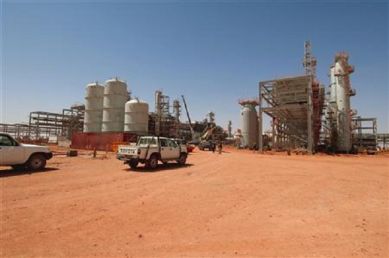30 hostages killed in Algeria gas plant rescue

Algerian troops stormed a desert natural gas facility to free hundreds of people held hostage by Islamists, but 30 died in the process including several westerners, according to a report.
About 600 local Algerian workers in Amenas, Algeria were free after the Algerian assault, however one witness, an Irish engineer, said he saw the troops blow up four jeeps which held hostages, according to Reuters.
The move to free the captives took place after the Islamists had demanded to be allowed to take the hostages abroad, the report said.
Algerians and foreign workers were taken hostage on Wednesday in an assault carried out as France was carrying out an assault on Islamist rebels in neighboring northern Mali.
Victims included two Japanese, two Britons, and a French national, a source told Reuters. Eight others were Algerian. The nationality of the others was unclear.
Japanese, British and Norwegian officials said they were not informed of the assault beforehand, according to the report.
One local man that escaped from the complex told Reuters that the captors were looking to kill "Christians and infidels."
"The terrorists told us at the very start that they would not hurt Muslims but were only interested in the Christians and infidels," said Abdelkader, 53 "'We will kill them,' they said."
Electrical engineer Stephen McFaul described part of the assault to his family, according to his brother, Brian McFaul.
He said the Algerian army intercepted five jeeploads of hostages moving from one part of the compound to another. He said the army bombed four of the five trucks
Algerian forces launched the operation after noticing that hostages were being moved toward "a neighboring country" where kidnappers could use them "as a means of blackmail with criminal intent," Algerian Communications Minister Mohamed Said told state television on Thursday, according to CNN.
UK Prime Minister David Cameron told Reuters that there was a possibility some hostages were still presumably held.
"It's a fluid situation, it's ongoing," Cameron said. "I think we should be prepared for the possibility of further bad news, very difficult news, in this extremely difficult situation."